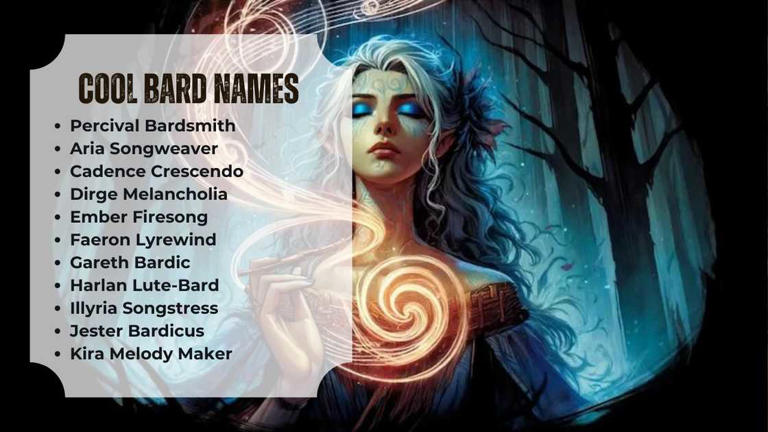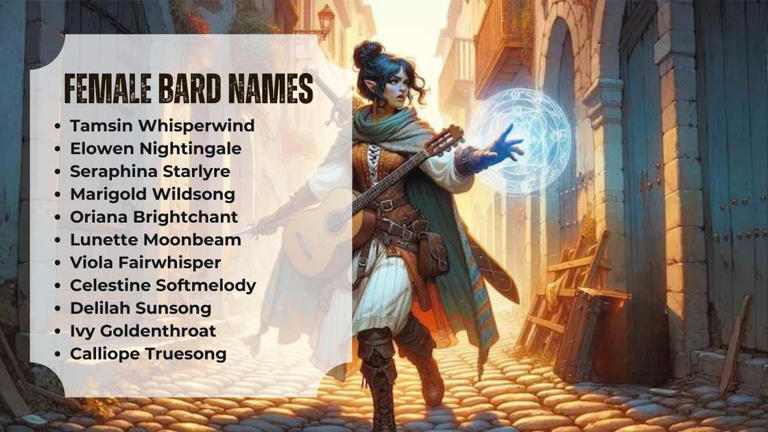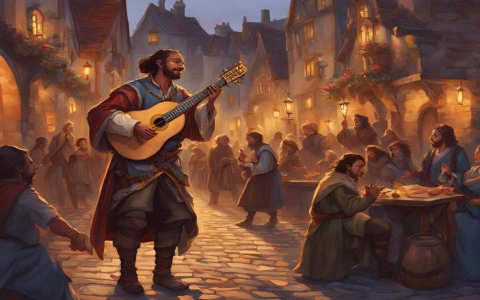Okay, so, I’ve been messing around with this idea of what makes a good bard name, you know, for role-playing games and stuff. And let me tell you, it’s been a journey. I started off thinking, “Hey, a good bard name should sound cool, right?” So I started jotting down names that sounded, I don’t know, kinda fancy. Think “Melodious” or “Harmony”.

But then, I went deeper. I started looking into what others thought. Some folks online were saying a good bard name doesn’t need to be complicated. They were like, “Just pick a name that fits the character’s race or how they were brought up.” So, I did that. I created a few characters with simple, straightforward names based on their backgrounds. This was way easier, and honestly, it felt more natural.
Then I stumbled upon this thing called a “Bard Name Generator”. Basically, it’s a tool that throws random names at you. Some are unique, some are funny, some are downright weird. I played around with it, clicking away, and got a bunch of names. Some were pretty good, like really good! It even had options for famous female bard names, which was neat.
The generator also let me get specific. I could type in stuff like “charming bard” or “mysterious minstrel” and add traits like “musical” or “witty”. It was kinda fun seeing what it would spit out. I spent hours just messing around with different combinations. It felt like I was on some kind of quest, you know? A quest for the perfect bard name!
I also found some interesting ideas from other gamers. Someone suggested focusing on the bard’s voice or mouth, like “Chartongue” or “Mander-Mouth”. Others were just throwing out random, cool-sounding names like “Sparkeye” or “Embergrin”. It got me thinking about how a name could really reflect a character’s personality and skills.
And get this, I even looked into the origins of the word “bard”. Turns out, it’s an old Irish word meaning “minstrel” or “singer-poet”. Pretty cool, huh? It made me appreciate the history behind the whole bard thing.

Oh, and for all you D&D nerds out there, apparently, half-elves make the best bards because of some bonus points they get. I’m not a huge D&D player myself, but I thought it was interesting.
Here’s what I ended up with:
- Simple and Sweet: I realized that sometimes, the simplest names are the best. They’re easy to remember and roll off the tongue nicely.
- Funny and Quirky: I had a blast coming up with names that were a little off-the-wall. These names were great for characters who were a bit more lighthearted or comedic.
- Deep and Meaningful: I also spent some time crafting names that had a deeper meaning or backstory. These were perfect for characters with a more complex history or personality.
- Generated Gold: Even though I didn’t use all of them, the name generator gave me some real gems. It’s a great tool for sparking ideas when you’re feeling stuck.
So, yeah, that’s my bard name adventure. It was a lot more involved than I initially thought it would be, but I learned a lot, and had some fun along the way. I think the biggest takeaway is that there’s no one right way to name a bard. It really depends on the character you’re creating and what kind of story you want to tell. Whether you go simple, complex, or just plain weird, the most important thing is to have fun with it!










